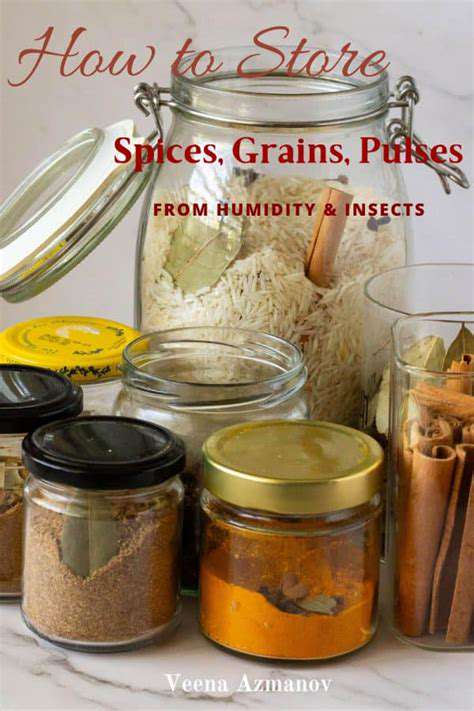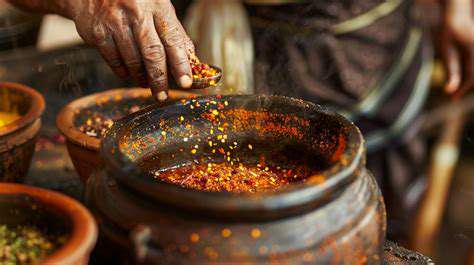Storing Spices: Maintain Potency
Jul 18, 2025 / btwgardenmachine/

Understanding Relative Humidity
Relative humidity (RH) is the amount of water vapor present in the air compared to the maximum amount the air can hold at a given temperature. Understanding this relationship is crucial for maintaining a comfortable and healthy environment, whether it's in your home, workplace, or even a specialized industrial setting. A high RH can lead to moisture problems and mold growth, while a low RH can cause dryness and discomfort.
Monitoring and controlling RH is important for preserving items like historical documents or artwork, ensuring optimal conditions for sensitive equipment, and preventing the development of harmful bacteria and fungi.
Methods for Measuring Humidity
Several methods exist for measuring relative humidity, ranging from simple hygrometers to sophisticated electronic sensors. These devices provide readings that allow for accurate monitoring and adjustments to maintain the desired humidity levels. Understanding the accuracy and limitations of different measuring instruments is essential for effective humidity control.
Digital hygrometers are commonly used for residential applications due to their ease of use and affordability. More advanced sensors are employed in industrial settings where precise control is critical, such as in data centers or pharmaceutical facilities.
Controlling Humidity in Homes
Maintaining a comfortable humidity level in your home can significantly impact your health and well-being. Proper humidity control can help reduce the risk of respiratory problems, allergies, and dry skin. Keeping the RH in a balanced range can also aid in the preservation of furniture and other household items.
Using a humidifier during dry seasons or a dehumidifier during humid seasons can help regulate the humidity level within a range that promotes comfort and prevents potential damage to your home.
The Impact of Humidity on Health
Fluctuations in relative humidity can significantly influence human health. High humidity can exacerbate respiratory problems, while low humidity can lead to dry skin, eye irritation, and other health issues. Maintaining a consistent RH level can help create a healthier indoor environment for everyone in the household.
Understanding the specific effects of humidity on different individuals, especially those with pre-existing respiratory conditions, is critical for personalized control strategies.
Industrial Applications of Humidity Control
Humidity control is not just a concern for residential settings. Numerous industrial applications require precise and consistent humidity levels to maintain optimal conditions for various processes and products. This includes the manufacturing of electronics, pharmaceuticals, and food products. Maintaining precise humidity levels can drastically improve the quality of products and prevent costly damage.
Controlling humidity is essential for preventing moisture damage to sensitive equipment and materials in data centers, warehouses, and other critical infrastructure environments.
Protecting Spices from Light and Air Exposure
Proper Storage Containers
Choosing the right container is crucial for preserving spice potency. Airtight containers, preferably glass or ceramic, are ideal. Avoid plastic containers, as some plastics can react with certain spices, altering their flavor and aroma over time. Look for containers with tight-fitting lids to prevent oxygen and light from reaching the spices, ensuring maximum freshness and preserving their vibrant flavors.
Consider using specialized spice jars with airtight seals. These containers are specifically designed to protect spices from the detrimental effects of light and air, helping to maintain their quality and preventing moisture buildup. Good storage solutions are an investment in maintaining the high quality of your spices for longer.
Controlling Exposure to Light
Light degrades the essential oils in spices, leading to a loss of flavor and aroma. Storing spices in opaque containers, such as glass jars with dark-colored lids or amber glass containers, significantly reduces light exposure. Avoid storing spices in clear containers or areas that receive direct sunlight. This simple step can make a noticeable difference in the longevity and flavor of your spices.
Sunlight and artificial light can quickly break down the delicate compounds in spices. Therefore, a dark, cool environment is the best place to keep your spices. This preservation method helps them maintain their potent flavors and aromas for longer periods.
Importance of an Airtight Seal
Spices are incredibly susceptible to the effects of air exposure. Air contains oxygen, which can oxidize the volatile compounds in spices, leading to a loss of flavor and aroma. An airtight seal prevents this process, preserving the spice's potency and maintaining its characteristic flavor profile. Ensure that your chosen storage containers have a tight-fitting lid to create a barrier against air and moisture.
Controlling Moisture Levels
Moisture is a significant enemy of spices. High humidity can lead to mold growth and spoilage, reducing the quality and safety of your spice collection. Maintaining appropriate storage conditions is key. Store spices in a cool, dry place, away from sources of moisture like damp areas or open water containers. This will help prevent the spices from absorbing moisture from the environment.
Proper Ventilation
While airtight containers are essential, proper ventilation within the storage area is equally important. Ensuring adequate airflow prevents moisture buildup and promotes dryness. This is crucial to maintaining the longevity and quality of your spices, especially during humid periods. Choose a storage location that has good ventilation to prevent moisture buildup and mold formation.
Spice Storage Location
The ideal storage location for spices is a cool, dark, and dry place. Avoid storing them in areas with fluctuating temperatures or high humidity. A pantry, cupboard, or designated spice rack away from direct heat sources are good options. A constant temperature environment ensures the longevity of your spices, allowing them to maintain their flavor and aroma for longer periods.
Frequency of Inspection
Regularly inspect your spice collection for any signs of spoilage, such as discoloration, mold, or unusual odors. Discard any spices that show signs of deterioration. This proactive approach helps maintain the quality of your spices and prevents the spread of potential contamination. Inspecting spices frequently allows you to identify and address any issues promptly, ensuring the freshness and quality of your entire spice collection.
Understanding the Impact of Grinding on Spice Shelf Life

Grindi's Effect on Productivity
Grindi, a term often used to describe a relentless work ethic, can significantly impact productivity. While dedication and focused effort are essential components of high productivity, an unhealthy obsession with work can actually hinder progress. Striking a balance between intense effort and well-deserved rest is crucial for sustained productivity in the long run. Excessive grinded work often leads to burnout, impacting both physical and mental well-being, ultimately reducing overall output.
There are many facets of grinded work ethic, from individual choices to societal pressures. Understanding the specific factors driving a person's work ethic is critical to assessing its impact on their productivity. This requires a nuanced approach, considering both the positive and negative aspects of this approach to work.
The Psychological Toll of Grindi
The relentless pursuit of productivity often takes a significant psychological toll. Constant pressure to perform can lead to feelings of anxiety, stress, and even depression. Prolonged periods of high-intensity work can lead to burnout, a state of physical and emotional exhaustion. Furthermore, this intense focus can lead to isolation and a disconnect from personal relationships and hobbies.
Social Implications of Grindi
The societal pressure to grinded work can create a culture of unhealthy competition. This can negatively impact interpersonal relationships, leading to strained communication and conflict. The focus on output often overshadows the importance of collaboration and teamwork. A culture that prioritizes grinded work often discourages rest and relaxation, potentially affecting overall societal well-being.
Grindi and Work-Life Balance
Maintaining a healthy work-life balance is crucial for overall well-being. Grindi often disrupts this balance, leading to a neglect of personal life, relationships, and leisure activities. This can have long-term consequences for mental and physical health. Individuals with a healthy work-life balance, however, often report higher levels of job satisfaction and reduced stress.
Grindi and Creativity
While grinded work might seem to boost productivity in the short term, it can actually stifle creativity. The intense focus on completing tasks can limit the exploration of new ideas and perspectives. A balanced approach that allows for periods of relaxation and inspiration is often more conducive to innovative thinking. This is because creative breakthroughs often emerge from unexpected connections and insights, which are less likely to arise during extended periods of intense focus.
Grindi and Long-Term Success
Sustainable success isn't solely about short-term output; it requires long-term well-being. A healthy approach to work, one that incorporates adequate rest, relaxation, and time for personal pursuits, is more likely to lead to long-term success. Focusing solely on grinded work can lead to burnout and ultimately hinder long-term achievements. Prioritizing personal well-being alongside productivity is critical for sustainable success in any field.